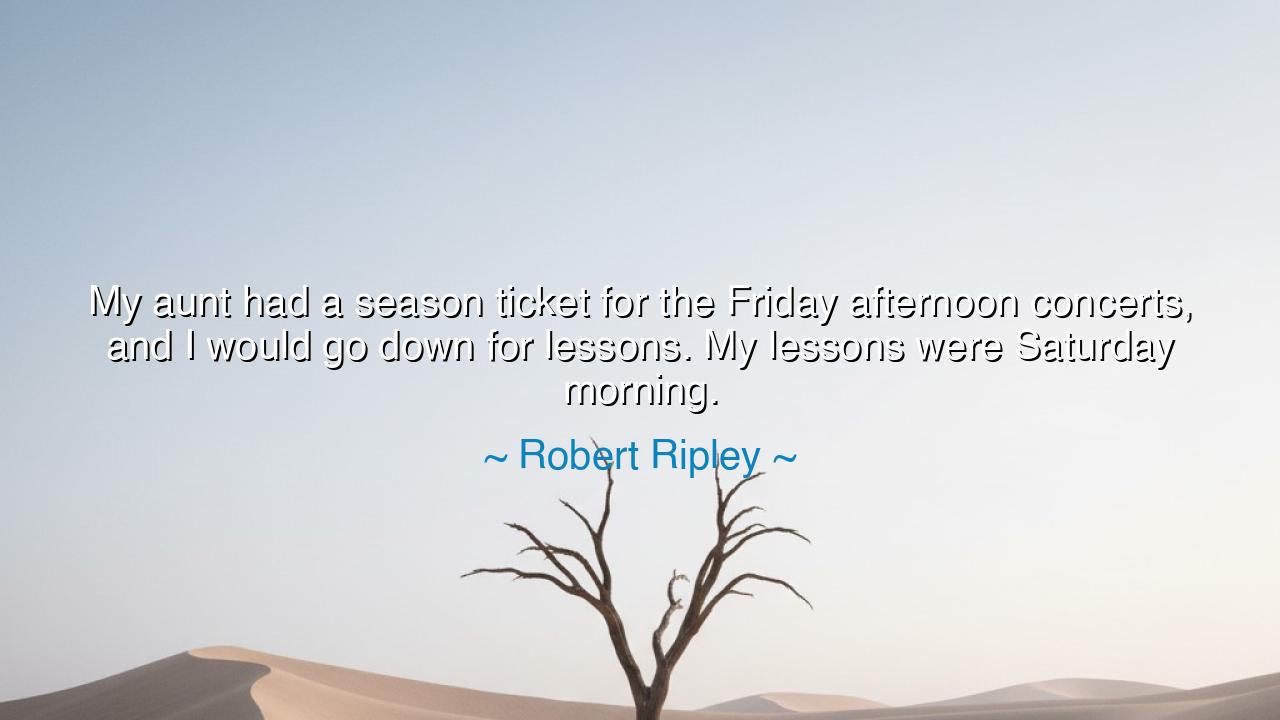
My aunt had a season ticket for the Friday afternoon concerts
My aunt had a season ticket for the Friday afternoon concerts, and I would go down for lessons. My lessons were Saturday morning.






Robert Ripley, remembered as a seeker of marvels and teller of wonders, once said: “My aunt had a season ticket for the Friday afternoon concerts, and I would go down for lessons. My lessons were Saturday morning.” At first glance, these words seem ordinary—an image of youth, of music, of a boy attending his training. But beneath their surface lies a lesson as old as the ancients: the inheritance of culture, the sacred duty of elders to guide the young, and the rhythm of discipline that shapes the soul.
The figure of the aunt, in this memory, stands as the guardian of tradition. She holds the ticket, the key to a world of sound and art, and by her presence she leads the young Ripley toward refinement. In the days of old, such figures were cherished—the elder who opens the gateway to knowledge, who ensures that the treasures of civilization are not lost. Just as the Greeks had their tutors and the Romans their philosophers, so too did this boy have his aunt, whose devotion to music carved a path for him to follow.
And consider the concerts: they are not merely gatherings of instruments, but temples of harmony. Each Friday, while the world carried on its toil, this place became a sanctuary where beauty and discipline merged. To sit within its walls was to taste something beyond the common lot of man, to hear what the soul can be when lifted by melody. It was there, in those Friday afternoons, that a seed was planted, a whisper of greatness, a reminder that beyond the noise of the world there is order, pattern, and divine rhythm.
The lessons, then, on Saturday mornings, became the continuation of this sacred cycle. For to listen alone is not enough; one must also practice, one must sweat, one must endure the repetition that transforms sound into mastery. The ancients knew this well: the student of the lyre, the pupil of the philosopher, the apprentice of the craftsman—each rose early, each bent his back to practice, each knew that true art is born not from desire alone, but from patient devotion. Ripley’s memory binds the inspiration of the concert with the discipline of the lesson, showing that greatness requires both vision and effort.
Consider the story of young Wolfgang Amadeus Mozart. Though hailed as a prodigy, his brilliance was not solely a gift from the heavens; it was cultivated by years of relentless training under the stern eye of his father. Concerts inspired him, yes, but it was the daily discipline—the ceaseless lessons—that transformed him into the master whose music still resounds centuries later. The same pattern lives in Ripley’s tale: inspiration on Friday, dedication on Saturday, and the steady forging of character in between.
The emotional power of this quote lies in its quiet truth: greatness is often born not from extraordinary events, but from simple routines upheld with devotion. The aunt, the concerts, the lessons—these are the pillars upon which Ripley’s early life stood. They reveal that culture is passed not by grand monuments alone, but by the weekly acts of love, patience, and discipline that elders gift to the young.
From this we may draw a lesson for our own lives: seek out those who can guide you, honor the traditions they bring, and balance inspiration with practice. Do not be content only to witness greatness—through concerts, books, or art—but commit yourself to the labor that follows. Let your Fridays be filled with vision, and your Saturdays with discipline. In this way, you will weave beauty into your life and pass it onward to those who come after you.
Thus Ripley’s words, though spoken simply, carry the weight of wisdom: that behind every marvel lies an inheritance, and behind every skill lies devotion. The ancients would nod in approval, for they too believed that life’s greatness is not achieved in a single day, but in the rhythm of days lived faithfully. To remember this is to walk the path of mastery, where inspiration and discipline join hands, and the soul learns to sing.






AAdministratorAdministrator
Welcome, honored guests. Please leave a comment, we will respond soon